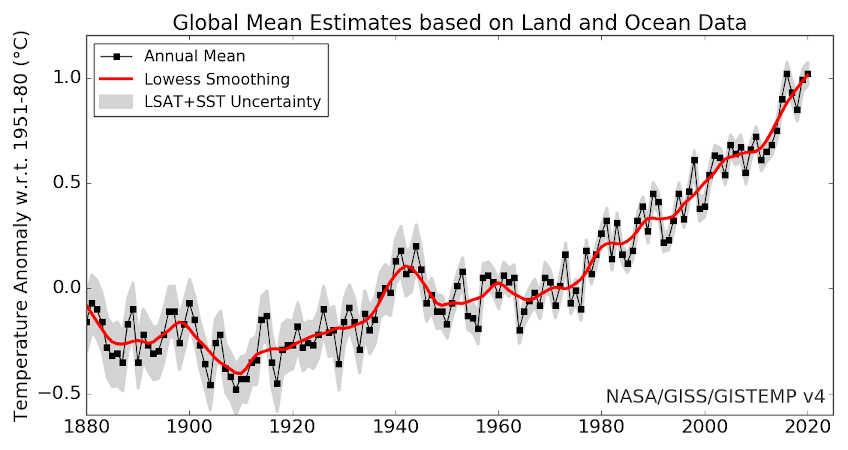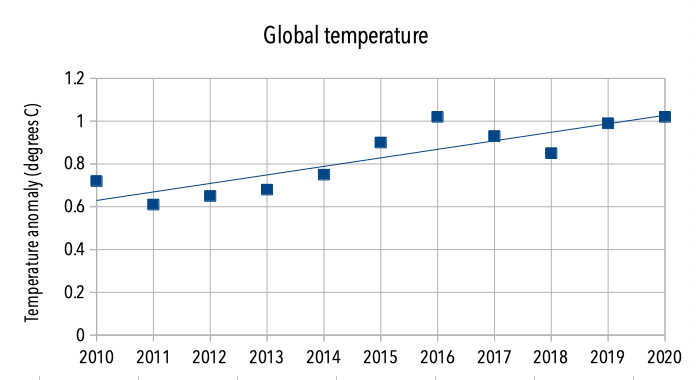Right through 2020, Craig Kelly has posted information about cold weather in some part of the world, and used this to claim that global warming is a hoax. Now that 2020 is over, we can assess whether his claims have substance.
The fact is, they don’t.
The claims
Mr Kelly has posted many examples of cold weather events. Here is a sample of many:
- On the weekend of 3-4 October, he posted three examples of record cold temperatures, in Northern Ireland, Georgia and New Jersey. He commented: And just think how colder it could have been if we’d listened ….. to take real action to stop global warming.”
- On 7 January 2021 he noted that Beijing had recorded the coldest morning in more than 5 decades. “I can just imagine discussion amongst the Chinese Communist Party leaders in Beijing; ‘’We must take real action on global warming’’’ he said.
- On 8 January 2021, he reported that Spain had experienced its coldest temperature ever recorded, and added: “And just imagine how cold it would have really been without all that global warming.”
Mr Kelly clearly thinks that these examples of record cold weather count against the facts of global warming and climate change.
The facts of the matter
Number of temperature records
Currently worldwide there are about 16,000 weather stations recording temperature for the Global Historical Climatology Network database.
Each of these stations records daily maximum and minimum air temperatures, and some record other variables as well (e.g. instantaneous and average air temperature, soil temperature). These readings can be aggregated into monthly and annual maxima, minima and averages, making almost 400 air temperature readings and statistics each year.
Simple mathematics shows that, with 16,000 stations producing 400 maximum and minimum temperature values each year, more than 12 million air temperature readings and summary values are produced each year. Any one of these could be a record maximum or minimum statistic.
Thus for Mr Kelly’s occasional cold weather facts to make any significant difference to global temperature he would have to find literally hundreds of thousands of record cold readings.
Proper analysis uses all the data
It is obvious that trying to find this many individual cold record readings is not a sensible way to assess global warming. Instead, we need to look at global averages for the surface temperature.
When this is done, it turns out that 2020 was the equal hottest year on record according to NASA. (The numbers showed it to be the hottest ever, but the difference wasn’t statistically significant.)
Because global temperature is calculated from millions of readings, spread unevenly around the world, methods to calculate it vary slightly. Thus the National Oceanic and Atmospheric Administration calculated 2020 to be the second hottest year, behind 2016, while Europe’s Copernicus network agreed with NASA that it was a tie between 2016 and 2020.
Everyone seems to agree that the last seven years (2014 to 2020) are the hottest on record. The following graphs show the clear trends.


What the data teaches us
We can draw three clear conclusions from the data.
1. Temperature varies from place to place.
There will be some locations with record high temperatures and others with record low temperatures. There will always be locations such as the ones Mr Kelly highlights, but they are in the minority and don’t change the global picture. The important fact for global warming is the global average.
2. Temperature varies from year to year
Effects like the El Nino-Southern Oscillation can change the global surface temperature by exchanging heat between the air and ocean. Other variations can occur too. So it is foolish, as sometimes happens, to conclude that global heating has stopped if the temperature stops rising for a few years. The important thing is the long term trend, and it is clearly rising.
3. The world is warming
Highlighting occasional cold weather is just refusing to face facts. The trend has been upwards for 50 years.
In Australia
2020 was the 4th hottest year on record in Australia. Some high temperature records were set, although not nearly as many as in 2019. All states experienced above average temperatures, and six of the 12 months were placed in the warmest 10 for each month.
Conclusion
It isn’t clear whether Mr Kelly simply doesn’t understand the temperature data, or whether he is simply refusing to believe the obvious and trying to misdirect attention away from the facts.
But either way, his statements are foolish and, in the long run, dangerous.
The world is warming, the predictions are coming true, and our government needs to act much more decisively than is currently occurring.
Graphic by hotblack on Morguefile.
